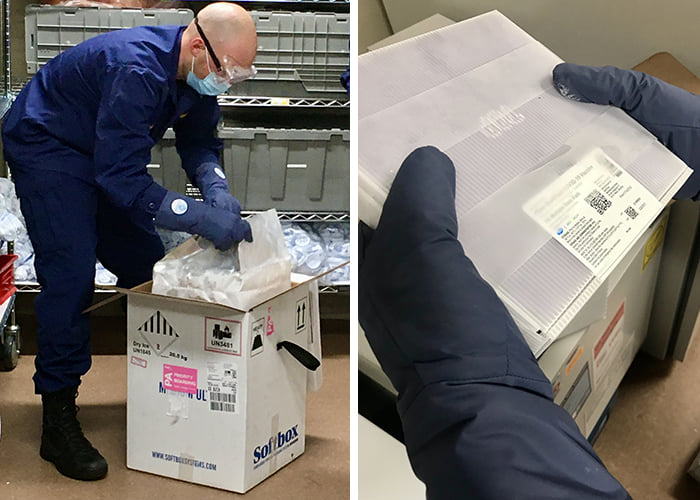
- Details
- By Native News Online Staff
Health care facilities across Indian Country received their first shipments of the recently approved Pfizer Covid-19 vaccine on Monday.
The Cass Lake Indian Health Service, one of three Indian Health Service facilities serving Minnesota's Bemidji area, became the first IHS facility to receive an initial distribution of the vaccine. Hospital staff received vaccinations upon its arrival.
The Cherokee Nation also celebrated receiving its first 975 doses of the Pfizer vaccine, with plans to distribute the vaccine this week.
The shipments of the vaccine are part of a first wave of doses that will be distributed to IHS facilities throughout December, but many people will have to wait to be vaccinated.
IHS expects to receive more than 64,000 doses of the Pfizer vaccine, which was approved last Friday by the Food and Drug Administration, by the end of the month. But as part of Phase 1A of IHS’s vaccine rollout plan, all initial doses will be reserved for health care workers and residents of long-term care centers.
The agency plans to distribute the vaccine to all of its 11 regional programs in the lower 48 states. The distribution of the vaccine to Alaska Native IHS facilities will be sent to the state of Alaska.
The vaccine developed by Pfizer, however, only represents about one-third of the initial purchase by IHS. The agency’s distribution plan calls for two-thirds of its vaccination plan to come from Moderna, which has yet to have its vaccine approved by the FDA.
More Stories Like This
Native News Weekly (August 25, 2024): D.C. BriefsUS Presidents in Their Own Words Concerning American Indians
Star-Studded Livestream to Boost Native News Online’s Year-End Campaign
Monday Morning (December 8, 2025): Articles You May Have Missed This Past Weekend
Native News Weekly (December 7, 2025): D.C. Briefs
Help us defend tribal sovereignty.
At Native News Online, our mission is rooted in telling the stories that strengthen sovereignty and uplift Indigenous voices — not just at year’s end, but every single day.
Because of your generosity last year, we were able to keep our reporters on the ground in tribal communities, at national gatherings and in the halls of Congress — covering the issues that matter most to Indian Country: sovereignty, culture, education, health and economic opportunity.
That support sustained us through a tough year in 2025. Now, as we look to the year ahead, we need your help right now to ensure warrior journalism remains strong — reporting that defends tribal sovereignty, amplifies Native truth, and holds power accountable.
 The stakes couldn't be higher. Your support keeps Native voices heard, Native stories told and Native sovereignty defended.
The stakes couldn't be higher. Your support keeps Native voices heard, Native stories told and Native sovereignty defended.
Stand with Warrior Journalism today.
Levi Rickert (Potawatomi), Editor & Publisher

